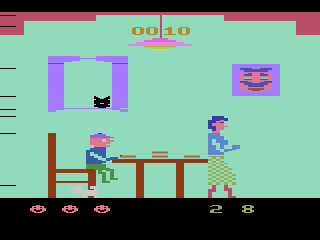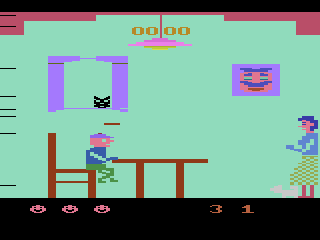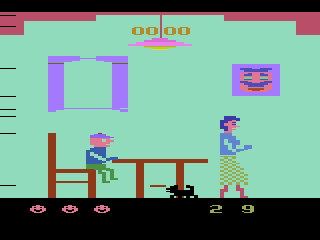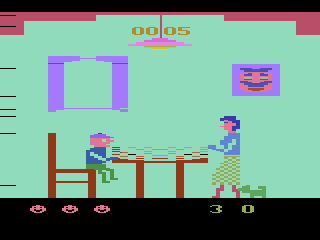Retro Replay Review
Gameplay
Mangia’ delivers a deceptively simple yet wildly addictive core loop: as Mama brings plate after plate of steaming pasta to the table, you must decide whether to gobble it down yourself or discreetly fling it to Frankie the cat or Sergio the dog. A single move of the joystick to the right then left lets you shovel pasta into your mouth, while a smooth diagonal flick (right/up for the window, right/down for under the table) sends dinner skittering to your furry accomplices. Timing is everything—if Mama catches you in the act of feeding the pets, she’ll raise the stakes with an extra three plates next round.
(HEY YOU!! We hope you enjoy! We try not to run ads. So basically, this is a very expensive hobby running this site. Please consider joining us for updates, forums, and more. Network w/ us to make some cash or friends while retro gaming, and you can win some free retro games for posting. Okay, carry on 👍)
The challenge intensifies quickly as you juggle limited resources: you start with four lives, but overindulge by eating more than 20 plates in one level and you’ll literally burst, costing you a life. Likewise, letting more than nine plates pile up on the table will cause a catastrophic collapse. Every level requires you to consume or toss a specific number of plates—31 plates on level 1, 32 on level 2, all the way to 49 plates on level 9—and the point value per plate climbs from 5 points at level 1 up to 13 points by level 9.
Success hinges on strategy and precision. Do you clear plates aggressively to avoid a tabletop collapse, or pace yourself to bank more points for extra lives? Remember, every 1,000 points nets an extra life, and your score caps at 9,999, so each toss or bite becomes a calculated risk. The controls are intuitive yet demanding: a split-second hesitation can send pasta flying to the wrong spot, triggering Mama’s wrath or a dropped plate fiasco.
As the levels progress, the margin for error shrinks. You’ll need laser focus to recognize when Frankie appears at the window and when Sergio pads beneath the table. Missing the timing even once can cascade into a penalty that quickly snowballs. Mangia’ turns what seems like a frantic feeding frenzy into a masterclass in split-second decision-making.
Graphics
While Mangia’ leans into a charmingly retro aesthetic, it manages to feel refreshingly vibrant. The pixel art brings Mama’s kitchen to life, with gleaming plates of pasta rendered in rich reds and golds, a cheery checkered tablecloth, and wide-eyed pets patiently awaiting their share. Background details—steam curling off pasta, Mama’s flour-dusted apron, subtle shadows under the table—add personality without overwhelming the action.
Despite its simplicity, the visual feedback is exceptionally well executed. A successful toss to Frankie triggers a playful meow animation, while Sergio’s triumphant wag of the tail upon catching a meatball-sized glob of sauce keeps the mood light and rewarding. Conversely, plates collapsing in a wooden crash or the shockwaves of an overstuffed belly are depicted with comedic flair, reinforcing both the stakes and the humor.
The game’s color palette evolves as you advance, giving each level a distinct ambiance. Softer, pastel hues characterize the early stages, lending a relaxed vibe, while deeper reds and browns in later levels signal the escalating intensity. Animations remain crisp throughout, ensuring that you never miss a visual cue critical to timing your actions.
Despite the minimalist approach, Mangia’ stands out by ensuring every sprite and background element serves gameplay clarity. There’s no visual clutter to distract from the fast-paced decision-making, yet enough detail to give the kitchen setting genuine warmth and character.
Story
At its heart, Mangia’ tells a simple yet endearing tale of family, food, and mischief. You step into the role of Mama’s ever-hungry child, desperate to indulge in an endless stream of pasta while sneaking meals to your beloved pets. There’s no sprawling narrative or cutscene marathon—just a lighthearted domestic setup that frames your frantic dinner table antics.
The charm lies in the relationships: Mama’s stern but loving presence, the hopeful mews of Frankie at the window, and Sergio’s hopeful whines beneath the wooden planks. Each character’s behavior informs your strategy, turning what could be a cold high-score chase into a scenario with genuine emotional beats. Missing a toss feels like disappointing a pet, and watching Mama pile on plates when you’re caught feeds into the affectionate comedic tension.
Levels are loosely tied together by the idea of ever-growing pasta feasts and the mounting challenge to keep pace. You won’t find plot twists or dramatic arcs, but the escalating gameplay and the intimate kitchen setting provide enough context to stay invested. By the time you reach the higher levels, you’ve already formed an unspoken bond with the cast of characters you’re racing to keep fed—or not fed—without detection.
While some players may crave a deeper storyline, Mangia’ succeeds by focusing on the joy of a shared meal and the warmth of a family kitchen. The simplicity of the premise is its greatest strength, ensuring accessibility and quick immersion from the first plate of pasta to the frantic finale.
Overall Experience
Mangia’ strikes a delightful balance between frantic reflexes and strategic planning. The risk-reward mechanics—juggle too many plates and face collapse, overeat and face a burst, but keep your eye on the score to earn precious extra lives—create a loop that’s hard to resist. Sessions remain bite-sized enough for quick play, yet demanding enough to keep you coming back to shave seconds off your best runs.
The audiovisual presentation complements the gameplay perfectly. Charming retro visuals paired with upbeat accordion-infused tunes set a jovial tone that never outstays its welcome. Pizza? Pasta? While there’s no pizza in sight, the soundtrack and sound effects evoke that cozy, trattoria atmosphere that keeps you tapping the joystick for “just one more level.”
Difficulty ramps up in a way that feels fair. Early levels let you familiarize yourself with controls, dog and cat positions, and Mama’s patterns. By midgame, the tension ratchets higher, demanding razor-sharp focus and near-perfect execution. Yet even if you lose a life, the quick restarts and short waves ensure you’re back in the game before frustration sets in.
For fans of classic arcade-style challenge combined with whimsical characters and a unique pasta-flinging twist, Mangia’ offers an experience that’s both nostalgic and refreshingly original. Whether you’re a high-score chaser or simply looking for lighthearted fun, Mangia’ plates up a feast of frantic, fun-filled action that’s hard to resist. Mangia!’s simple premise belies a deeply satisfying and surprisingly strategic game that will leave you shouting “Mama mia!” with delight—and maybe just a little bit hungry for pasta.
 Retro Replay Retro Replay gaming reviews, news, emulation, geek stuff and more!
Retro Replay Retro Replay gaming reviews, news, emulation, geek stuff and more!








Reviews
There are no reviews yet.